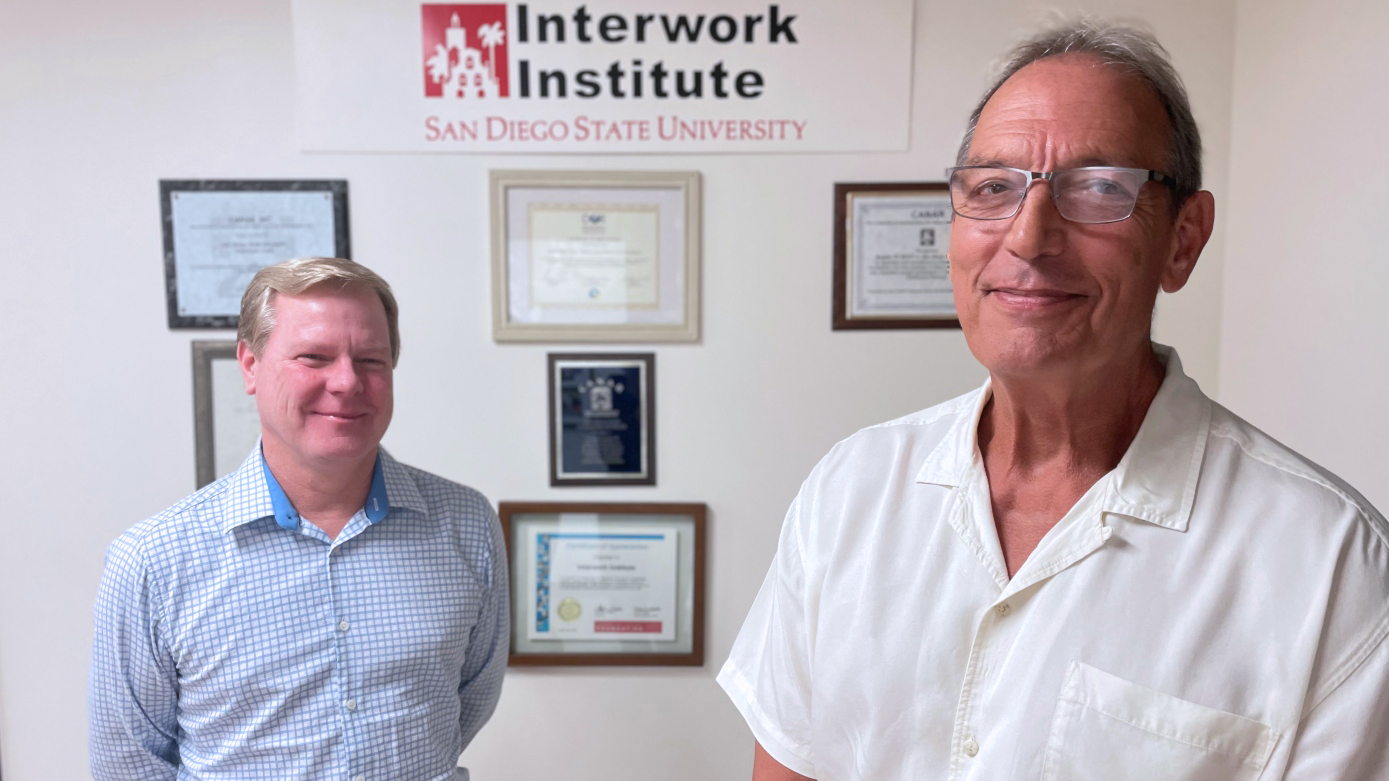$30 million federal grant cements SDSU’s national leadership in vocational rehabilitation
The Rehabilitation Services Administration award to the Interwork Institute will establish a technical assistance center to help agencies across the U.S. better serve people with disabilities.

In one of the largest federal grants in San Diego State University history, the Interwork Institute has been selected to launch a national center to help vocational rehabilitation programs across the U.S. better empower individuals with disabilities to attain careers and independence.
In late September, the U.S. Department of Education, Rehabilitation Services Administration awarded $30 million over five years to support the creation of the National Vocational Rehabilitation Technical Assistance Center (NVRTAC).
The grant is the largest award SDSU has ever received from the Department of Education, and the largest award ever garnered by the College of Education. It was also one of four major grants awarded by RSA to SDSU in one week that will boost vocational rehabilitation and rehabilitation counseling services.
“This historic award underscores SDSU’s unwavering commitment to advancing opportunity through education, research and innovation,” said SDSU President Adela de la Torre. “The Interwork Institute’s leadership in vocational rehabilitation has transformed many thousands of lives already, and this new funding will expand that impact across the nation.”
“This award also reflects the strength of our College of Education faculty whose dedication ensures SDSU continues to shape the future of workforce development and social mobility on a national scale,” de la Torre added.
Based out of the Interwork offices on Alvarado Road, NVRTAC will support 78 vocational rehabilitation (VR) agencies, including those in all 50 states and territories such as Puerto Rico, the U.S. Virgin Islands, Guam and the Commonwealth of the Northern Mariana Islands.
"We're helping government programs operate as efficiently and effectively as possible in serving people with disabilities and helping them go to work,” said Chaz Compton, program director at the Interwork Institute. “Because of our assistance, those programs can not only improve services to those individuals, but increase the number of people they serve, increasing their economic independence."
Mark Tucker, professor in rehabilitation counseling and the principal investigator on the grant, said state VR agencies play a critical role in leveling the employment playing field for the disability community. He added that the Interwork Institute team, alongside longtime partners such as George Washington University, will be well-positioned to make a significant positive impact.
“In a lot of cases, our Interwork team has been grounded in VR longer than the people leading the agencies,” Tucker said. “They can provide a lot of support.”
While the current environment for federal funding remains unpredictable — particularly with the Department of Education facing an uncertain future — funding for technical assistance and training is written into the Rehabilitation Act of 1973. Should Education be shuttered, vocational rehabilitation grant making may transfer over to another agency, such as the Department of Labor.
Leadership and innovation
The creation of NVRTAC adds a new dimension to SDSU’s decades of national leadership in vocational rehabilitation — particularly through the Interwork Institute, which has been on the forefront of this work since its founding in 1991.
In 2015, RSA selected Interwork to lead the Workforce Innovation Technical Assistance Center, one of several national VR technical assistance centers based on specific areas of focus. In 2020, that was pared down to two national centers — one based out of SDSU (known as VRTAC) and the University of Wisconsin–Madison.
Now, Interwork will be home to all of it.
“We've had a good run of quality, heavy-duty, intense work that really laid the foundation for success in the project,” Compton said. “We're going to be able to hit the ground — not just running — but full-speed ahead. All of the infrastructure and knowledge is in place.”
As such, the Interwork team is preparing to roll out new innovations to help agencies improve efficiency and performance.
NVRTAC will launch a fiscal talent accelerator program that will train VR agency budgetary staff how to manage programs more efficiently. They have also partnered with software firm IntelliTect to create an artificial intelligence-driven case management assistant program that will allow counselors to automatically populate pertinent client information taken during conversations into clients’ files.
“One of the reasons that the counselors leave the field often is they feel overwhelmed or overburdened with paperwork,” Tucker said. “If we can lighten the load on them, they can do more of what they were trained to do, which was counseling people, not typing. So we think it may increase job satisfaction, too.”
Training grants
Three more RSA awards in September to faculty in the Department of Administration, Rehabilitation and Rehabilitation (ARPE) will boost SDSU’s efforts to bring more qualified rehabilitation counselors to the field. The training grants will support students in the rehabilitation counseling program, ranked No. 7 in the nation by U.S. News & World Report.
In these three grants:
- Professor Charles Degeneffe and Tucker received $1 million for five years to annually support 16 students in advanced certificate programs on cognitive disabilities, psychiatric rehabilitation and co-occurring disorders.
- Associate professors Mari Guillermo and Toni Saia received $1 million over five years to annually support 12-15 emerging scholars in distance learning programs.
- Saia and Guillermo also received $875,000 over five years to annually support eight to 10 students per year in the advanced certificate program on rehabilitation technology, which focuses on topics such as AI-integrated learning.
Under each grant, students will receive stipends to help ease the cost of the program and living expenses, provided they work for at least one year at a state vocational rehabilitation agency for each semester of support.
“These training grants tremendously help our students and they are really critical for getting students to go into this profession,” Degeneffe said. “Being able to secure grant funding in this kind of funding environment definitely says a lot for the program and for SDSU.”



